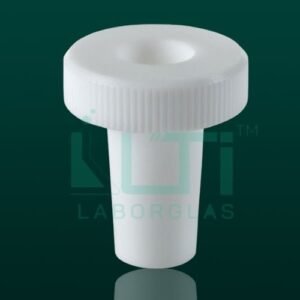Material : Polypropylene, Autoclavable
| PART No. | Capacity (ltr) | PACK Qty. |
| 5210-10 | 10 | 1 |
| 5210-20 | 20 | 1 |
Here are some common uses of carboys:
- Chemical Storage:
- Carboys are often used for the storage of chemicals in laboratories and industrial settings. They are available in different materials, including glass, plastic (such as polyethylene or polypropylene), and stainless steel, to accommodate various chemical compatibility requirements.
- Solvent Dispensing:
- In laboratories, carboys can be used for dispensing solvents and other liquids. The narrow neck allows for controlled pouring, and some carboys may have spigots or faucets for easy dispensing.
- Media and Reagent Storage:
- Carboys are suitable for storing and transporting culture media, reagents, and other liquids used in biological and biochemical applications. They provide a secure container with a large volume capacity.
- Bulk Chemical Handling:
- Industrial facilities often use large plastic or stainless steel carboys for handling bulk quantities of chemicals. These carboys may be equipped with features such as handles and wheels for easier transport.
- Waste Collection:
- Carboys with appropriate chemical resistance can be used for the collection of liquid waste in laboratories. They are often labeled and color-coded for specific waste types to comply with safety and environmental regulations.
- Water Storage:
- Large plastic carboys are commonly used for storing and dispensing water in laboratory or industrial settings. They may have built-in handles for easy carrying.
- Sampling and Transport:
- Carboys are used for collecting, storing, and transporting liquid samples in environmental monitoring, water analysis, and other sampling applications. Some carboys are designed to be leak-resistant during transport.
- Fermentation and Brewing:
- In the brewing industry, carboys are used for fermenting and aging liquids such as beer or wine. Glass carboys are popular for this purpose due to their inert nature.
- Oil and Lubricant Storage:
- Industrial facilities use carboys for storing oils, lubricants, and other fluids. Some carboys may be designed for specific industries, such as automotive or manufacturing.
- Liquid Dispensing Systems:
- Carboys with dispensing spigots or faucets are integrated into liquid dispensing systems in laboratories or manufacturing processes, allowing for controlled and measured dispensing.
- Pharmaceutical Production:
- Carboys are used in the pharmaceutical industry for the storage and transport of liquids, chemicals, or pharmaceutical ingredients in bulk.
- Acid and Base Storage:
- Carboys made of materials resistant to corrosive substances are used for storing acids and bases safely in laboratories.







